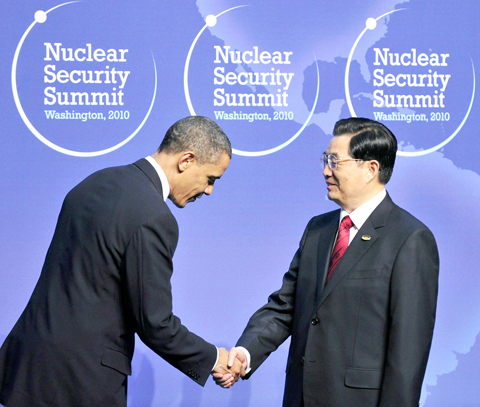China said yesterday it wanted any UN Security Council action on Iran to promote a diplomatic way out of the nuclear standoff, edging closer to openly backing a resolution while hedging on sanctions.
The remarks from Chinese Foreign Ministry spokeswoman Jiang Yu (姜瑜) followed a meeting on Monday between Chinese President Hu Jintao (胡錦濤) and US President Barack Obama in which, said a US official, Hu agreed his government would help craft a new Security Council resolution pressing Iran over its nuclear activities.
Jiang was not so blunt, but her comments appeared to leave scant doubt that Beijing accepts that fresh Security Council action over Iran is coming, even if China wants room to negotiate over the sanctions proposed by Western powers.

PHOTO: EPA
“We believe that the Security Council’s relevant actions should be conducive to easing the situation and conducive to promoting a fitting solution to the Iranian nuclear issue through dialogue and negotiations,” Jiang told a news conference in Beijing, answering a question about the talks between Hu and Obama in Washington. “We support protecting the international nuclear non-proliferation regime and peace and stability in the Middle East, and oppose Iran possessing nuclear weapons.”
China has close energy and economic ties with Iran and has been reluctant to back tougher sanctions, but Beijing has backed past rounds of UN sanctions against Iran, and in New York last week five other key powers supported talks on possible new sanctions.
“China seems in principle to accept that there will be a new Security Council resolution with sanctions, otherwise we simply wouldn’t have discussions on a draft,” said Zhu Feng, a professor of international relations at Peking University. “But the question is what level of sanctions will be in the resolution, and that will be the focus of negotiations.”
Beijing is one of five permanent members of the UN Security Council, each with the power to veto any proposed resolution. The five powers and Germany together make up the “P5+1” group that steers international talks on the Iran nuclear dispute.
US and Chinese officials who briefed reporters after the Hu-Obama talks described a positive atmosphere on Iran, which Western powers say is seeking the ability to make nuclear weapons, contravening atomic security safeguards.
Iran says its nuclear activities are for peaceful ends.
The dispute has long been a thorny one for China, which is a big oil customer of Iran and has also long been skeptical of the effectiveness of international sanctions.

WAITING GAME: The US has so far only offered a ‘best rate tariff,’ which officials assume is about 15 percent, the same as Japan, a person familiar with the matter said Taiwan and the US have completed “technical consultations” regarding tariffs and a finalized rate is expected to be released soon, Executive Yuan spokeswoman Michelle Lee (李慧芝) told a news conference yesterday, as a 90-day pause on US President Donald Trump’s “reciprocal” tariffs is set to expire today. The two countries have reached a “certain degree of consensus” on issues such as tariffs, nontariff trade barriers, trade facilitation, supply chain resilience and economic security, Lee said. They also discussed opportunities for cooperation, investment and procurement, she said. A joint statement is still being negotiated and would be released once the US government has made

Authorities have detained three former Taiwan Semiconductor Manufacturing Co (TMSC, 台積電) employees on suspicion of compromising classified technology used in making 2-nanometer chips, the Taiwan High Prosecutors’ Office said yesterday. Prosecutors are holding a former TSMC engineer surnamed Chen (陳) and two recently sacked TSMC engineers, including one person surnamed Wu (吳) in detention with restricted communication, following an investigation launched on July 25, a statement said. The announcement came a day after Nikkei Asia reported on the technology theft in an exclusive story, saying TSMC had fired two workers for contravening data rules on advanced chipmaking technology. Two-nanometer wafers are the most

NEW GEAR: On top of the new Tien Kung IV air defense missiles, the military is expected to place orders for a new combat vehicle next year for delivery in 2028 Mass production of Tien Kung IV (Sky Bow IV) missiles is expected to start next year, with plans to order 122 pods, the Ministry of National Defense’s (MND) latest list of regulated military material showed. The document said that the armed forces would obtain 46 pods of the air defense missiles next year and 76 pods the year after that. The Tien Kung IV is designed to intercept cruise missiles and ballistic missiles to an altitude of 70km, compared with the 60km maximum altitude achieved by the Missile Segment Enhancement variant of PAC-3 systems. A defense source said yesterday that the number of

Taiwanese exports to the US are to be subject to a 20 percent tariff starting on Thursday next week, according to an executive order signed by US President Donald Trump yesterday. The 20 percent levy was the same as the tariffs imposed on Vietnam, Sri Lanka and Bangladesh by Trump. It was higher than the tariffs imposed on Japan, South Korea and the EU (15 percent), as well as those on the Philippines (19 percent). A Taiwan official with knowledge of the matter said it is a "phased" tariff rate, and negotiations would continue. "Once negotiations conclude, Taiwan will obtain a better